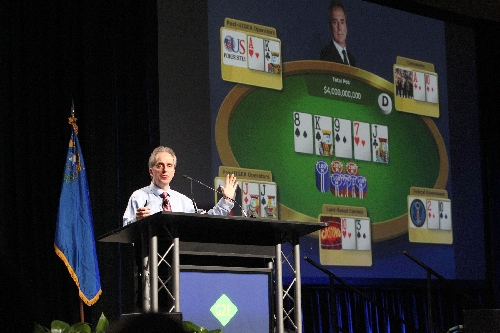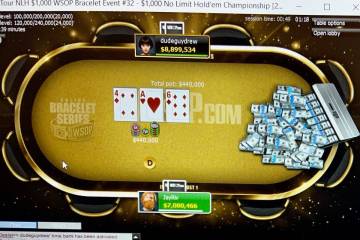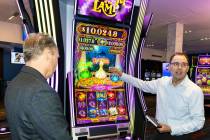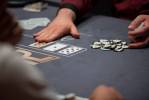Bwin.party’s online poker celebration will have to wait
Earlier this year, bwin.party Digital Entertainment co-Chief Executive Officer Jim Ryan was asked to deliver a Global Gaming Expo keynote address.
He thought the event would be a victory lap.
At the time, chances seemed to favor Congress voting to legalize Internet poker.
Gibraltar-based bwin.party had three partnership agreements in place to jump into the U.S. market.
However, it wasn't meant to be.
"I thought it would be magical and we would be the toast of the town," Ryan said Thursday following his G2E presentation at the Sands Expo and Convention Center.
The hourlong discussion turned into a giant $4 billion Internet poker game displayed on large screens in The Venetian's ballroom.
Before the Gaming Control Board has a massive coronary, let's be clear: The five-handed game was a free roll. Money did not change hands. A jack of clubs on the river chopped the imaginary pot for three winners - U.S. poker players, the federal government and land-based casino operators.
The final card, Ryan said, depicted federal legalization of Internet poker gaining approval. The simulated game was a history lesson that carried a message: If Internet poker is regulated in the United States, there will be many winners.
"There is a real opportunity being missed," Ryan said.
The absence of U.S. players from the Internet poker community has hurt bwin.party's bottom line. Although you wouldn't know it.
The company, which was created in March 2011 when bwin Interactive Entertainment and PartyGaming PLC merged, created the world's largest online poker company. Bwin.party is traded on the London Stock Exchange and produced more than $1.06 billion in revenues and $259.4 million in cash flow during 2011.
The company owns PartyPoker and the World Poker Tour, as well as legal online sports wagering websites and online casinos with slot machine-style games, table games and bingo. All are based in Europe.
PartyGaming operated online poker in the United States before the Unlawful Internet Gaming Enforcement Act became law on Sept. 29, 2006. That day, PartyGaming ceased its U.S. operations.
The move cost the company 78 percent of its business and its market capitalization collapsed by $8 billion in 24 hours.
"It was the right decision," Ryan said.
Three years later, PartyGaming signed a settlement with the U.S. Department of Justice, paid a $105 million fine and was cleared from ever being prosecuted for its pre-act online gaming operations.
Ryan said the settlement was an "expensive" but sound business decision.
The company is free to jump back into the U.S. gaming market. Lack of a federal legislation, however, is stopping U.S. poker consumers from again being able to log onto PartyPoker.
"The real opportunity is federal legislation," Ryan said. "Make it available to all states, tax it at 16 percent and it creates a larger liquidity pool."
Last year, bwin.party signed agreements with MGM Resorts International and Boyd Gaming Corp. to jointly own an online company that offers poker to U.S. customers under bwin.party's brands. Bwin.party would own 65 percent of the company, MGM Resorts would own 25 percent and Boyd would own 10 percent.
Separately, Boyd and MGM Resorts have long-term agreements that allow the casino operators to manage their own online poker websites under their various brands through a licensing agreement that uses bwin.party's technology and gaming platforms.
The agreements hinge on Congress passing a bill that would legalize and set up the federal regulation and taxation of Internet poker.
Clearly, bwin.party isn't waiting. The company has applied for a Nevada license for interactive gaming, one of more than three dozen companies seeking approval.
Boyd Gaming officials told Nevada gaming regulators last week that their company would wait until bwin.party is licensed before launching an intrastate poker website.
In May, bwin.party signed a similar agreement with the United Auburn Indian Community, operators of the Thunder Valley Casino near Sacramento in case California enacts intrastate Internet poker.
"If it happens on a state-by-state basis, we have to be prepared to operate that way," Ryan said.
Online gaming companies that accepted wagers from Americans before the Unlawful Internet Gaming Enforcement Act's passage have been angling to get back into the U.S. market.
As for companies that continued to accept wagers from Americans after the act's passage, federal Internet poker legislation proposed by Senate Majority Leader Harry Reid, D-Nev., and Sen. Jon Kyl, R-Ariz., would prohibit their re-entry for at least five years, according to a summary of the bill.
Ryan said that strengthens bwin.party's position.
Ryan told the G2E audience that Internet poker expanded in revenues and number of players between 2002 and 2006. The activity also fueled growth in live poker, as shown by the World Series of Poker Main Event. Entries in the $10,000 buy-in tournament grew from 839 in 2003 to 8,773 in 2006. Many players won seats through online satellite events.
That kind of growth could repeat itself.
"U.S. regulations will happen, but the question is how they will happen," Ryan said.
Howard Stutz's Inside Gaming column appears Sundays. He can be reached at hstutz@reviewjournal.com or 702-477-3871. He blogs at lvrj.com/blogs/stutz. Follow @howardstutz on Twitter.




























